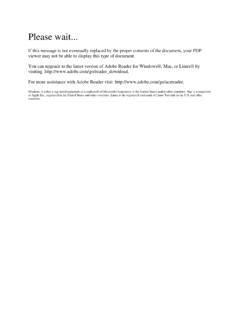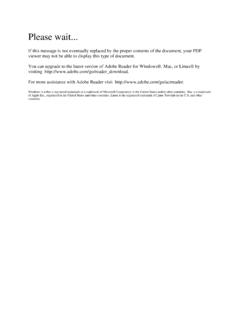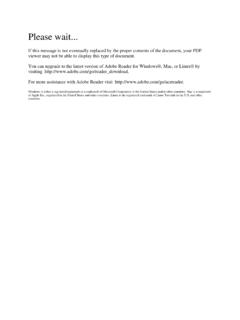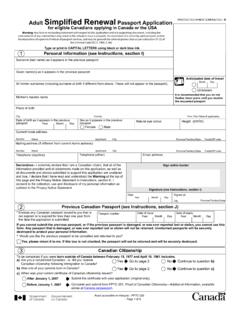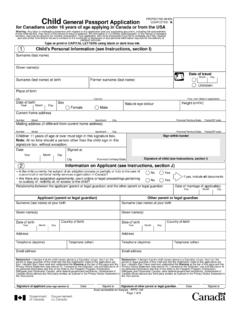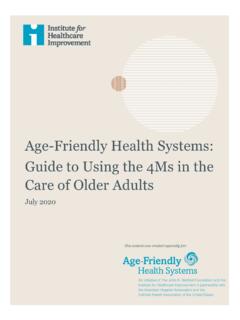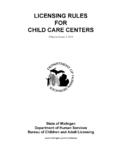Transcription of An Advisory Committee Statement (ACS) National Advisory ...
1 1 | GUIDANCE ON BOOSTER COVID-19 VACCINE DOSES IN CANADA UPDATE DECEMBER 3, 2021 An Advisory Committee Statement (ACS) National Advisory Committee on Immunization (NACI) Guidance on booster COVID-19 vaccine doses in Canada Update December 3, 2021 2 | GUIDANCE ON BOOSTER COVID-19 VACCINE DOSES IN CANADA UPDATE DECEMBER 3, 2021 PREAMBLE The National Advisory Committee on Immunization (NACI) is an External Advisory Body that provides the Public Health Agency of Canada (PHAC) with independent, ongoing and timely medical, scientific, and public health advice in response to questions from PHAC relating to immunization.
2 In addition to burden of disease and vaccine characteristics, PHAC has expanded the mandate of NACI to include the systematic consideration of programmatic factors in developing evidence based recommendations to facilitate timely decision-making for publicly funded vaccine programs at provincial and territorial levels. The additional factors to be systematically considered by NACI include: economics, ethics, equity, feasibility, and acceptability. Not all NACI Statements will require in-depth analyses of all programmatic factors. While systematic consideration of programmatic factors will be conducted using evidence-informed tools to identify distinct issues that could impact decision-making for recommendation development, only distinct issues identified as being specific to the vaccine or vaccine-preventable disease will be included.
3 This Statement contains NACI s independent advice and recommendations, which are based upon the best current available scientific knowledge. This document is being disseminated for information purposes. People administering the vaccine should also be aware of the contents of the relevant product monograph. Recommendations for use and other information set out herein may differ from that set out in the product monographs of the Canadian manufacturers of the vaccines. Manufacturer(s) have sought approval of the vaccines and provided evidence as to its safety and efficacy only when it is used in accordance with the product monographs.
4 NACI members and liaison members conduct themselves within the context of PHAC s Policy on Conflict of Interest, including yearly declaration of potential conflict of interest. 3 | GUIDANCE ON BOOSTER COVID-19 VACCINE DOSES IN CANADA UPDATE DECEMBER 3, 2021 INTRODUCTION On October 29, 2021, NACI published interim guidance on booster COVID-19 vaccine doses in Canada. Since NACI s initial guidance: Health Canada has authorized the use of Pfizer-BioNTech Comirnaty 30 mcg (on November 9, 2021) and Moderna Spikevax 50 mcg (on November 12, 2021) as booster doses in those 18 years of age and older at least 6 months after completion of the primary series.
5 Cases of COVID-19 are increasing rapidly in various countries with a trend of rising COVID-19 related deaths. Incidence rates of COVID-19 decreased and then increased slightly in some jurisdictions in Canada as of November 24, 2021. A new variant of concern (VoC), Omicron ( ) has been identified. Information on this VoC is still emerging including its impact, if any, on vaccine effectiveness (VE). Evidence has evolved on decreasing protection against SARS-CoV-2 infection and symptomatic illness over time, and some studies have shown decreases in protection against serious disease in some populations since the completion of a COVID-19 primary vaccine series.
6 Evidence on the potential benefit and safety of booster doses of mRNA COVID-19 vaccines has evolved and no safety concerns have been noted following the booster doses beyond those recognized after the primary series. The risk of myocarditis/pericarditis after a booster dose of an mRNA vaccine appears to be lower than the already rare risk after the second dose of the primary series but higher than after the first dose. On October 28, 2021, the Chief Medical Officers of Health (CCMOH) added goals for the next phase of the Canadian COVID-19 immunization response including to: 1.
7 Minimize serious illness and overall deaths while preserving health system capacity , and 2. Reduce transmission to protect high risk populations. NACI has reviewed the evolving situation and evidence and has updated evidence-informed recommendations in this new context. While the term booster dose is used in this guidance, NACI continues to monitor the emerging scientific data on whether this dose is indeed a booster dose (to stimulate the memory response once protection has truly waned), or should be considered part of the primary series (to establish strong immune response and memory).
8 NACI will adjust the terminology as required. NACI continues to recommend a primary COVID-19 vaccine series with an authorized mRNA vaccine in all authorized age groups, and continues to recommend that immunization in those who are eligible but who have not yet received their primary series should remain the top priority. NACI acknowledges the urgency for vaccinating people around the world who have not yet received any COVID-19 vaccine or completed their primary series. COVID-19 vaccines have been shown to be very effective against symptomatic laboratory confirmed SARS-CoV-2 infection, severe disease, hospitalization, and death from COVID-19 to date.
9 Incidence rates of new SARS-CoV-2 infection as well as rates of hospitalization, ICU admission, and mortality continue to be highest among unvaccinated individuals. In addition, those who have been vaccinated are less likely to become infected, and therefore are less likely to transmit SARS-CoV-2 infection to others. 4 | GUIDANCE ON BOOSTER COVID-19 VACCINE DOSES IN CANADA UPDATE DECEMBER 3, 2021 However, in the context of the circulating Delta ( ) variant, evidence is emerging that VE against SARS-CoV-2 infection and COVID-19 decreases with time after the primary series and there may be some decrease in protection against severe illness (especially in older individuals).
10 Decreasing protection against infection could contribute to increased transmission, since infected individuals may be a source of infection for others. Therefore, a booster dose may provide more durable protection to reduce infection, transmission, and in some populations, severe disease. METHODS The evidence pertaining to the need for and benefit of COVID-19 booster doses is rapidly evolving. NACI reviewed this evidence on November 30, 2021 and approved these updated recommendations on December 2, 2021. To date, NACI has published the following evidence-informed guidance on booster doses: 1.
